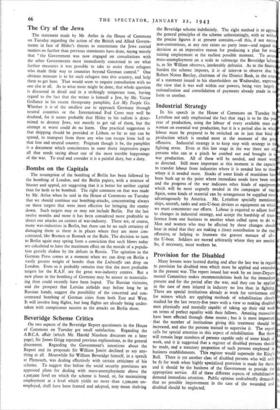Beveridge Scheme Critics
On two aspects of the Beveridge Report questioners in the House of Commons on Tuesday got small satisfaction. Regarding the A.B.C.A. affair (which Mr. Harold Nicolson discusses on a later page), Sir James Grigg repeated previous explanations, to the general discontent. Regarding the Government's intentions about the Report and its proposals Sir William Jowitt declined to say any- thing at all. Meanwhile Sir William Beveridge himself, in a speech at Plymouth, was dealing effectively with certain criticisms of his scheme. To suggest that before the social security provisions are approved plans for dealing with mass-unemployment above the 1,500,000 level on which the scheme is based, or, for maintaining employment at a level which yields no more than 1,5oo,coo un- employed, shall have been framed and adopted, may mean shelving
the Beveridge scheme indefinitely. The right method is to approt the general principles of the scheme unhesitatingly, with or with the precise figures it at present contains,—all this, if not entire' non-contentious, at any rate raises no party issue—and regard th decision as an imperative reason for producing a plan for ma taining employment at the earliest possible moment. To assun mass-unemployment pn a scale to submerge the Beveridge 'ache is, as Sir William observes, intolerably defeatist. As to the financ burden the scheme imposes, it is of interest to observe that S Robert Noton Barclay, chairman of the District Bank, in the cour of a statement issued to his shareholders on Wednesday, expres the view that it was well within our powers, being very largely rationalisation and consolidation of payments already made in on form or another.


























 Previous page
Previous page